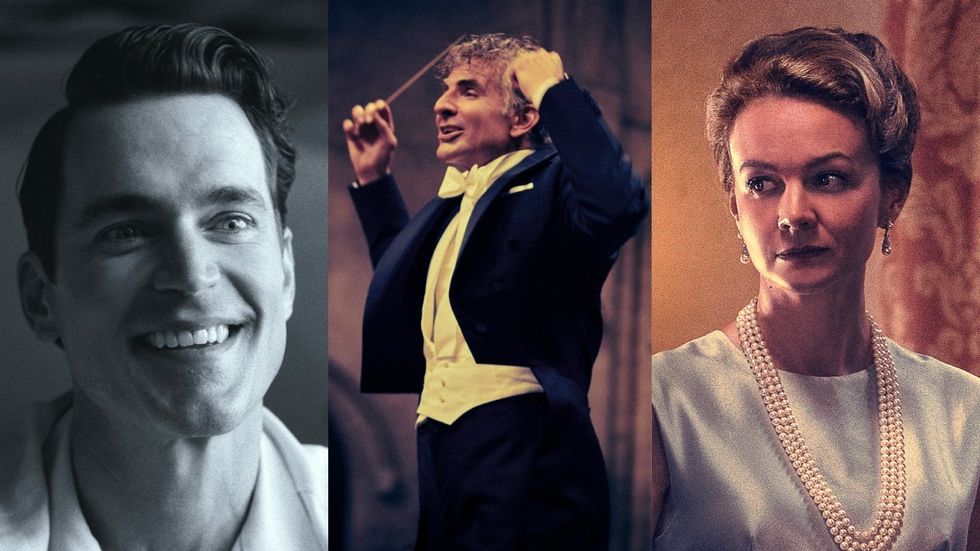Editor’s note: this review contains major spoilers of Netflix’s Maestro.
Bradley Cooper is a master at reinventing himself, pushing his limits, and defying what the public expects from him as a Hollywood A-lister. After making a name for himself in very of-the-time comedies like 2005’s Wedding Crashers, 2009’s He’s Just Not That Into You, and the Hangover trilogy, Cooper successfully transitioned into what critics often call a “serious actor.”
The back-to-back trio of 2012’s Silver Linings Playbook, 2013’s American Hustle, and 2014’s American Sniper proved that Cooper is a talented and compelling dramatic actor. Though these were much more serious films, he successfully carried over the relatability factor and sense of humor that he had earned through his previous work. Cooper even earned Academy Award nominations for his acting in all three of those projects, which served as a solid introduction to the world of prestige cinema in his career.

Image: Warner Bros. Pictures
Cooper’s directorial debut, 2018’s A Star Is Born, was mired in challenges, and not just because this was his first time directing a film. This was the newest addition to a long-standing series of beloved films of the same name. This was Lady Gaga’s first time as a lead actress in a feature film. This was a film about music that required a very strong soundtrack. Scenes involving crowds of music fans were needed, which had to be shot in actual festivals (while trying to keep secrecy about the project). Cooper also chose to star in the movie, besides directing, in a role that required him to sing like a veteran country superstar.
In the end, 2018’s A Star Is Born was well-received and achieved every single relevant goal that it set out to accomplish. Cooper was highly praised as a first-time director, and there were nothing but rave reviews for his acting and singing performances. Gaga’s acting was also incredibly celebrated, leaving audiences impressed by how she was able to disappear into this character despite it being so close to her real life as a musician. The film received several Academy Award nominations, including Gaga’s first Oscar nomination for acting, and her first Oscar win for Best Original Song with “Shallow.”
Five years later, Cooper releases his second film as a director, 2023’s Maestro, which also features him starring in the lead role. And after so many years of watching Cooper get nothing but perfect scores every time he tackles a new challenge, some distracting erasures and curious revelations are brought to the surface in Maestro, making us wonder what’s next for this Hollywood star.
It’s not ‘Tár’ — not even close.

Image: Netflix
We didn’t want to start critiquing Maestro like this, but there’s a Tár-sized elephant in the room that needs to be addressed. It’s really, really bold for anyone to release a prestige drama about a complex, queer, anti-hero conductor just one year after the Todd Field-directed, Cate Blanchett-starring masterpiece that is Tár. To make matters worse, as director and actor, Cooper’s work was immediately compared to both Field and Blanchett as soon as Maestro was released.
While general audiences might’ve forgotten about Tár when they opened up Netflix and pressed play on Maestro, that wasn’t the case for most critics, voters, and media pundits who spent most of last year’s awards season salivating over a film that had some folks literally convinced that Lydia Tár had been a real person and this was a biopic about her life. The timeliness of the Maestro release was not the tea, and we just have to start there.
Bradley Cooper doesn’t fully embody the character of Leonard Bernstein.

Image: Netflix
All tea, no shade, but Cooper just isn’t convincing in his portrayal of Leonard Bernstein. We are told that the character is eccentric, talented, quirky, and queer, but we often don’t really see that in the performance. There are varying speaking patterns to convey quirkiness, lots of limp-wrist movements to display queerness, and deliberate lines of dialogue to suggest eccentricity. But we don’t see that man in Cooper.
This is the actor who brought to life a bipolar divorcee in Silver Linings Playbook and had us all in shambles. The actor whose nuanced performance of a military veteran experiencing PTSD in American Sniper had even conservative straight white men suddenly talking about mental health. The actor who played a jaded musician struggling with substance abuse and peeing on Lady Gaga at the Grammy Awards, and who still had us rooting for him and their love story.
A lot of discourse regarding Cooper’s performance focused on his prosthetic nose. Maybe that prosthetic wasn’t the best choice. But honestly, there are several distracting — and disingenuous — elements to this performance that have nothing to do with the prosthetic.
Bisexual representation-ish.

Image: Netflix
The biographers of Leonard Bernstein have probably written a few notes about Maestro. The conductor’s relatives have their points of view, too. These are standard reactions to a biopic about a person you’re very familiar with. But for an average audience member, Maestro is a film about a bisexual conductor whose marriage to a woman, Felicia Montealegre (played by Carey Mulligan), is a complete disaster.
As of 2024, we are fighting harder than ever for bisexual representation in mainstream media so that bi people aren’t erased, nor dismissed as “labeling themselves as bi even though they’re just gay and don’t want to acknowledge that.” But here’s the thing: Maestro heavily suggests that Bernstein was actually much more of a gay guy who called himself bisexual because that’s what many queer men had to do during that time if they dared to come out.
In several scenes between Bernstein and Montealegre, it is made pretty clear that this is not a man who has too much interest in her — or in other women — very often. The character of Montealegre quite literally states how absent Bernstein is as a husband, and how his cheating is nearly always with men.
While it’s unfair to judge the labels and actions that real-life Bernstein had to rely on to survive within his queerness, Maestro shows a lot of the consequences of his actions while rarely showing the actions that provoked those consequences. We keep being told that Bernstein is a terrible husband who has zero physicality with Montealegre and loves to sleep around with men. But there’s a lot of “tell, don’t show” going on here… and it’s an odd choice.
Matt Bomer is barely in it.

Image: Netflix
Speaking of which, we get to the Matt Bomer of it all. While Maestro was filming, Gay Twitter (now Gay X, I guess) was sent into overdrive after scenes of Cooper and Bomer kissing at a park surfaced online. Bomer was cast to play David Oppenheim, who was reportedly a frequent lover of Bernstein.
Given that the crux of Maestro is the failed marriage story between Bernstein and Montealegre, sometimes even superseding his professional achievements, one would rightfully assume that his extramarital relationships would be a focus point of the film. But here’s the catch: Bomer is barely in it. There are, like, two or three scenes with Bomer. He barely speaks, and some of his cameos are blink-and-you-miss-it moments. The most regular lover in Bernstein’s life, the person who causes so much of this mess that he deals with Montealegre, is virtually erased in this 129-minute feature film.
Much like Tár played a role in how we viewed Maestro, we had even more recently just watched Showtime’s Fellow Travelers. In the series, Bomer plays Hawkins, who marries Lucy (Allison Williams) but is realistically in love with Tim (Jonathan Bailey). The TV show finds a perfect balance when showing the complications between these three people: how Hawkins is an absent husband but still cares and tends to Lucy, the jealousy — but also bond — that Tim and Lucy develop for each other, the nuances of being a bisexual man in a time when being out was even more dangerous than it can still be today. Bomer’s performance as Hawkins also shows how great of an actor he is, which has led to several acting nominations for him and Fellow Travelers.
From a story standpoint, it would’ve made sense for Oppenheim to be much more featured in Maestro. From an acting standpoint, Bomer’s talents were severely underutilized.
Carey Mulligan delivers one of the most incredible performances of 2023.

Image: Netflix
On the opposite end of underutilizing Bomer in the film, the biggest strength of Maestro is the spotlight placed right on top of Mulligan’s spectacular performance as Montealegre. We’re very gay over here, so we’re hyper-aware that Mulligan has been a phenomenal actress for many years now. But, goddammit, her Maestro performance somehow still stands out as something to behold. Mulligan has some tough competition ahead of her in the Academy Award for Best Actress, but this could very well be an Oscar-winning role if the field wasn’t jam-packed as it is.
The key to an exciting and enjoyable viewing of Maestro is to focus on Mulligan and all her choices as Montealegre. This is a masterclass in acting that lifts every line of dialogue and every other performer around her. In fact, Mulligan’s performance is so brilliant that it makes us wonder: is Cooper the next great director of female performances, and we’re just over here waiting for him to realize that?
In all of these award-season videos with round-tables and one-on-one interviews featuring Cooper as a director, we have yet to see someone bring up this serendipitous “coincidence” of how well he directed Gaga (acting as a lead in her first-ever film) and Mulligan (despite the actress’ prolific career also including so many other great performances). There’s something about Cooper’s process as a director that revealed a new acting star in Gaga and brought out what could very well be Mulligan’s third Academy Award nomination.
The irony is not lost on us that Cooper’s performance as a conductor didn’t land, whereas his actual conducting of female actresses in A Star Is Born and Maestro might be the greatest revelation of his directorial career thus far.
Maestro is now streaming on Netflix.
































































































